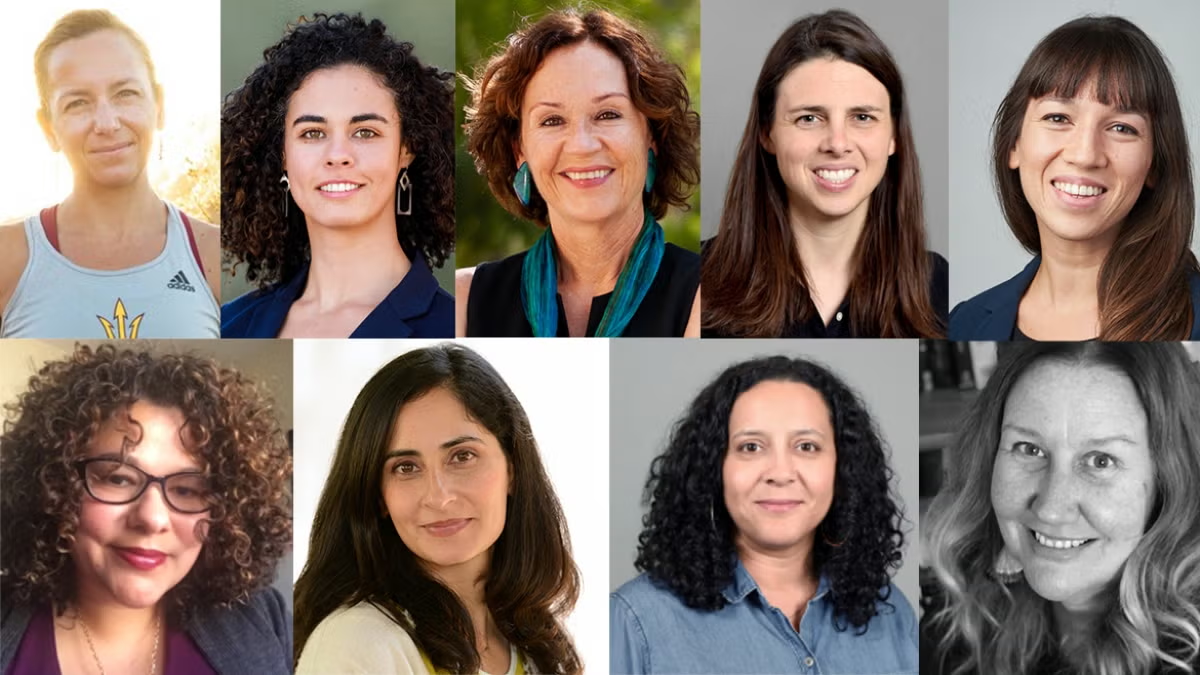Female ASU faculty share challenges, triumphs and what gives them hope about the future of women in academia

In celebration of Women’s History Month, nine female faculty from The College shared challenges they have faced, triumphs they have experienced and what gives them hope about the future of women in academia. (Top, left to right): Victoria Jackson, Esther Florsheim, Nina Berman, Sara Brownell and Hue-Tam Jamme. (Bottom, left to right): Sujey Vega, Pardis Mahdavi, Mako Fitts Ward and Michelle McGibbney Vlahoulis.
Bold. Inspirational. Fearless.
These are just a few of the words that female faculty in The College of Liberal Arts and Sciences use to describe women in higher education careers.
At Arizona State University, female faculty make up almost half of the overall faculty population: As of fall 2018, 48% of faculty were women. In The College, 46% of faculty were women as of 2018–19. Year over year, these percentages have continued to increase, with similar trends seen at universities nationwide.
“As more women enter more spaces in academia, especially positions of leadership, I'm hopeful that there are more voices and more perspectives to create meaningful structural change that uplifts women to excel in whatever we choose to study and research,” said Mako Fitts Ward, assistant professor in the School of Social Transformation.
Although representation of women in higher education careers is generally on the rise, challenges toward achieving equity and inclusion remain.
“Overt sexism is less prevalent now but there are countless instances of gender bias and discrimination that affect women in academia,” said Sara Brownell, associate professor in the School of Life Sciences. “Whether it's being asked to take notes at a meeting, not having your ideas attributed to you or not even being invited to a meeting — women experience gender bias. These seemingly insignificant challenges all add up over time.”
For The College, addressing these challenges and others that women in higher education positions face begins with supporting existing projects and creating new initiatives that drive change.
“Creating equitable environments starts with investing in existing programs and people that have already been doing the work for a long time,” Fitts Ward said. “It also requires leaders to build transformational relationships by deepening their awareness of how power operates and leaning into the power that they have to make institutional change swiftly in ways that start with the most vulnerable within a community.”
Faculty across ASU and The College are leading myriad efforts to find solutions to issues of gender bias.
The Research for Inclusive STEM Education Center is one initiative that was launched last year with the goal of making higher education more inclusive through innovative research, ongoing events and campuswide interventions. In addition, last year The College launched a committee focused on justice, equity, diversity and inclusion that works to empower the community to engage in change around systemic racism and inequity in higher education.
“When we talk about the work of equity, justice, diversity and inclusion, women, of course, are at the forefront of that conversation,” said Pardis Mahdavi, dean of social sciences in The College. “This committee is striving to change the culture, the climate, the curriculum and the structures of the institution to pave the way for more equity for people of all genders, including women.”
In celebration of Women’s History Month, female faculty from The College shared challenges they have faced, triumphs they have experienced and what gives them hope about the future of women in academia.
More Science and technology

From food crops to cancer clinics: Lessons in extermination resistance
Just as crop-devouring insects evolve to resist pesticides, cancer cells can increase their lethality by developing resistance to…

ASU professor wins NIH Director’s New Innovator Award for research linking gene function to brain structure
Life experiences alter us in many ways, including how we act and our mental and physical health. What we go through can even…

ASU postdoctoral researcher leads initiative to support graduate student mental health
Olivia Davis had firsthand experience with anxiety and OCD before she entered grad school. Then, during the pandemic and as a…